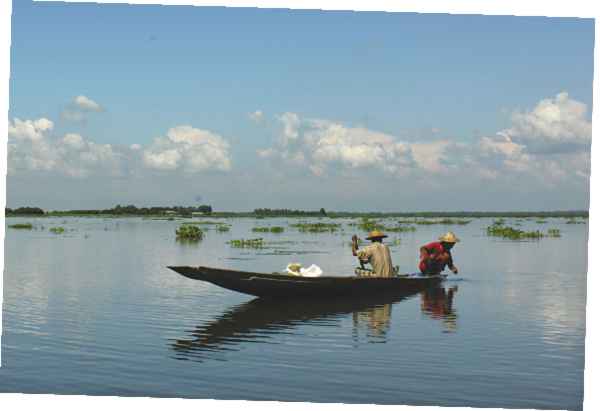COVER STORY
waltzing with the wild
Promoting responsible tourism
The fact that Bangladesh is a cornucopia of natural treasures is an undeniable one. Although a victim of overpopulation and rapid urbanisation, the knowledge that a mere four hours away from the bustling capital Dhaka lies the Lawachara Forest Reserves is testament to Bangladesh's greenery.
Of course, this is just one example. Every corner of Bangladesh has something to offer for nature lovers, whether that be vast expanse of unbroken beaches or rolling lush green hills. However, the question remains whether Bangladesh can preserve its often considered inherent natural beauty.
To escape the monotony and chaotic existence of city life, many opt to travel to Bangladesh's more serene and green retreats. However, whilst soaking up the wonders of the wild, many tend to forget the need to protect the environment they savour so much.

Inconsiderate littering, micing and disturbing the harmony of nature all contribute to damaging the area in question. Plus, the fact that these last remaining portions of untouched scenery play host to tourists more than its capacity only adds to already increasing problems.
Lawachara, once again, is a case in point. The massive forest, now reduced to less than half its original size, continues to suffer from the massive surge of tourists. The lack of infrastructural and logistic support makes supervision and catering to the influx of tourists extremely difficult.
The forest animals are disturbed, trees are uprooted and waste is disposed of wherever the people please, all of which eventually lead to the diminishing beauty of the areas. Very few pay heed to the sensitivity of an ecological system which leads to imbalances, resulting in more than just the loss of few tourist's money.
Given the current scenario, it is rather prudent to bring up the notion of Responsible Tourism, which isn't the same as eco-tourism. Eco-Tourism dwells on environmental consciousness and seeks to encourage the people to enjoy a certain area while leaving the least amount of carbon footprint.

Responsible Tourism on the other hand instills a responsible behaviour that one shows towards the entirety of a fragile ecosystem. This change in behaviour cannot be expected to come over night. An individual would obviously need direction and a slight nudge in the right path.
Nishorgo Network, a network of affiliated co-management forest and wetland protection sites, is the organisation which focuses on showing people the light.
Under USAID, Nishorgo Network serves 25 protected areas of Bangladesh, which includes forests and wetlands, among others. “Ami Prokritir, Prokriti Amar', as their slogan, Nishorgo Network promotes their simple message which states “Leave only footprints”, as the first step towards responsible tourism.
The responsible tourism campaign aims to make travellers more responsible, sustainable, and respectful to the natural environment. Protection of bio-diversity is the top priority for the organisations involved. The Nishorgo Network implements various projects to support their programme whilst partnering with universities, schools and locals of the project area, to create awareness on this important matter.
“Anyone who cares for the environment can become a part of the Nishorgo Network,” Iffat Nawaz, Communication Specialist of Nishorgo Network, says.
As the old adage goes, actions speak louder than words. Providing scope for a united front, Nishorgo Network has implemented various schemes to not only nurture the bio-diversity of the areas they are working in but ensure that their activities do not deprive the people dependent on the natural resources of their source of income.
“Of all the ticket sales to enter various forest reserves, such as Lawachara, 50 percent goes to support the community dependent on the forest,” Iffat Nawaz informs.
She also adds how 20 lakh was raised just via ticket sales in Lawachara alone. Furthermore, two eco-cottages, the Nishorgo Eco Cottage and Litchiari Cottage, both usually fully booked, reinvest 10 percent of all profits made back to a fund designed to protect the forest and its community.
As a side note to the success, the Litchiari Cottage was the brain child of one Shaheed Ul Haq of Srimongol, who set up the cottage based on the success of Nishorgo's own cottage. Using personal loan, savings and fund IPAC's help, Shaheed Ul Haq set up the cottage.
This is just one example of USAID's attempt to help entrepreneurs as part of their Alternate Income Generation, who in turn pay back a portion of the profits made to the co-management community fund.
Furthermore, 250 trained eco-guides, help show the people around these ecologically vulnerable areas. Working nationally, these guides can act up to 1000 taka daily and this is another creation of an occupational opportunity which keeps the locals off the forests.
Nishorgo Network has also received much support from Wildlife Trust, Wildlife Conservation, Guide Tourist, Bangladesh Bird and IUCN. The Department of Fisheries, Department of Environment and Forest Department have also been supportive of the project and are now slowly becoming more interested in its thorough implementation.
“There is a lot to see apart from the scenery, such as the many migratory birds that Bangladesh's wetlands (Beels) attract.” Iffat informs. “However, littering can trap and kill these vulnerable birds while many are also captured,” she adds.
Nishorgo Network, keeping this in mind, provides patrols for the forests along with the forest guards already there. Unfortunately, without a change in the overall mindset of people, a greener future continues to look bleak.
“The private sector needs to step up and take part in conservation of our natural resources as part of their CSR programmes,” Iffat proposes.
She also urges the youth to be more involved. Iffat concludes by pointing out the main point of segregation between the much trumpeted eco-tourism and the needed responsible tourism. “There still lies one glaring difference between eco-tourism and responsible tourism. You can buy the former but you can only learn to adhere by the latter.”
By Osama Rahman
Photos by Sayam U Chowdhury

